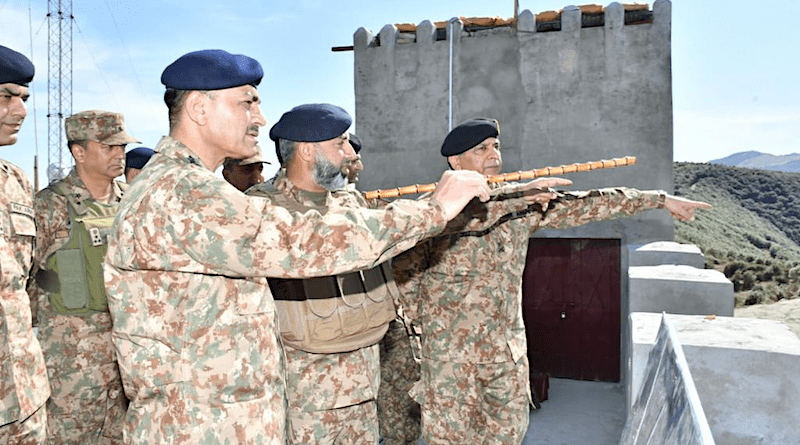Pakistan’s Stalwart Support For Palestine In A Turbulent Landscape – OpEd
In the northeastern garrison city of Rawalpindi, Pakistan’s army chief, Gen. Asim Munir, recently asserted that Islamabad will steadfastly continue its support for Palestinians in their struggle against the “unlawful occupation of their territories and Muslims’ sacred places.” This declaration comes at a crucial juncture in the Gaza-Israel conflict, as the world witnesses the devastating toll on innocent lives and the widespread displacement of Palestinians.
Gen. Asim Munir’s statement underscores Pakistan’s unwavering commitment to the Palestinian cause, rooted in diplomatic, moral, and political support. This principled stance reflects not just a geopolitical alignment but a resonant call for justice, echoing the sentiments of millions who believe in the fundamental right of a people to live free from occupation and oppression. The unequivocal support for Palestinians is embedded in the ethos of the Pakistani nation, resonating with a collective yearning for justice and equality. As the global community grapples with the complexities of the Gaza-Israel conflict, Pakistan stands firm in advocating for an enduring resolution that respects the rights of Palestinians and seeks an end to the unlawful occupation of their territories. In a recent meeting of commanders, the Pakistani military expressed deep concern over the unfolding events in the Gaza-Israel war, particularly highlighting the enormous human cost inflicted on innocent civilians. The statement from the army’s media wing reflects not just political posturing but a genuine compassion for the suffering of the Palestinian people.
The disproportionate use of force by Israel, as observed by Pakistan, has led to a humanitarian crisis of immense proportions. Over one million people in Gaza have been displaced, nearly half of the territory’s total population, according to the UN Relief and Works Agency for Palestine Refugees in the Near East (UNRWA). This dire situation has prompted Pakistan to take concrete steps, such as immediately dispatching humanitarian relief assistance to Gaza, demonstrating a commitment to alleviating the plight of the Palestinian people.
Gen. Asim Munir’s statement comes amid growing domestic anger in Pakistan and intensified diplomatic efforts to bring an end to the killing of civilians in Gaza. The international community, while grappling with the complexities of the conflict, cannot ignore the urgency of addressing the human cost and the immediate need for humanitarian relief. The geopolitical landscape is fraught with challenges, but Pakistan’s proactive diplomacy signals a determined effort to make a difference. The country’s Foreign Ministry has announced coordination with various organizations, including the Palestinian Red Crescent Society, relevant UN agencies, the government of Egypt, and Pakistan missions abroad. This coordinated effort aims to finalize the modalities of aid delivery, showcasing a practical approach to extend support beyond rhetoric.
To understand Pakistan’s unwavering support for Palestine, one must delve into the historical context. The struggle for Palestinian self-determination resonates with Pakistan’s own journey towards independence. The parallels between the two narratives, marked by the quest for sovereignty and justice, create a symbiotic connection that goes beyond geopolitical alliances.
Pakistan’s founder, Muhammad Ali Jinnah, expressed solidarity with the Palestinian cause as early as 1945, recognizing the shared aspirations for freedom. Over the decades, this solidarity has evolved into a foundational element of Pakistan’s foreign policy, grounded in the principles of justice, human rights, and the right to self-determination.
The current phase of the Gaza-Israel conflict began with Hamas initiating Operation Al-Aqsa Flood in response to the storming of the Al-Aqsa Mosque and increased violence by Israeli settlers. The ensuing Israeli military operation, named Operation Swords of Iron, has resulted in a devastating impact on civilian lives. Israel’s response, which includes cutting water and electricity supplies to Gaza, has exacerbated the already challenging living conditions in the region. The unofficial tally reports staggering figures: over 2,800 Palestinians, including 750 children, killed in Israeli airstrikes on Gaza, and 60 deaths in the West Bank. The conflict has also claimed the lives of at least 1,400 Israelis. These numbers reflect not just statistics but the profound human tragedy unfolding in the region.
Beyond the geopolitical chessboard, beyond the historical narratives and alliances, lies a fundamental plea for humanity. The anguish felt by Pakistan over the suffering of the Palestinian people is echoed globally by those who believe in the intrinsic value of every human life, irrespective of nationality or creed. Pakistan’s stance in the current crisis is not merely a matter of strategic calculation but a manifestation of a broader commitment to justice and human rights. It calls on the international community to recognize the urgency of the situation, to acknowledge the human cost, and to prioritize humanitarian relief efforts.
As the Gaza-Israel conflict continues to unfold, the world finds itself at a crossroads. Pakistan’s robust support for Palestine serves as a beacon, reminding the global community of its collective responsibility to uphold justice and prevent further loss of innocent lives. Beyond diplomatic statements and aid deliveries, the true impact lies in fostering a narrative that values human life over political considerations. It lies in advocating for dialogue, peaceful resolution, and the recognition of the rights of every individual to live free from the shadows of conflict and occupation.
In conclusion, Pakistan’s support for Palestine in the face of the Gaza-Israel conflict is not just a geopolitical alignment but a manifestation of a deep-rooted commitment to justice and human rights. As the international community grapples with the complexities of the situation, the call for humanity must resonate louder than ever. The immediate need for humanitarian relief, the pursuit of lasting peace, and the acknowledgment of the shared human experience demand concerted efforts from nations across the globe. In the quest for justice, in the pursuit of a better world, it is the duty of all nations to stand in solidarity with those who suffer and work towards a future where conflicts are resolved through dialogue and compassion triumphs over adversity.

